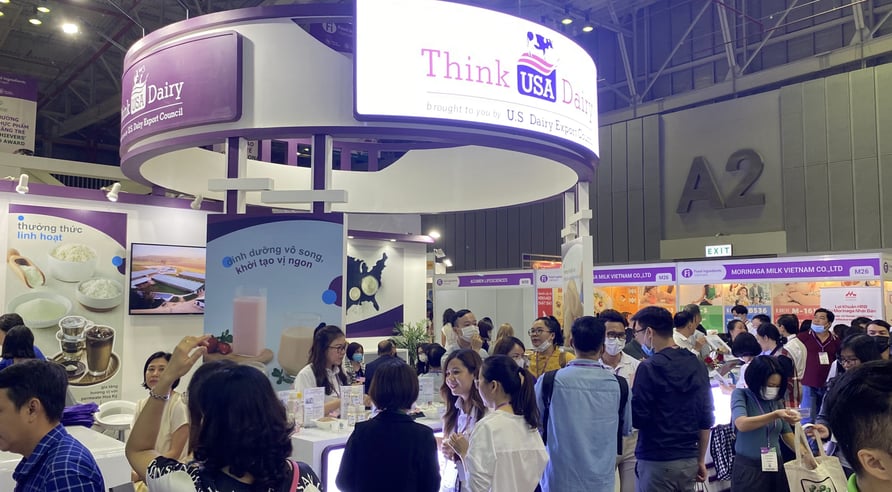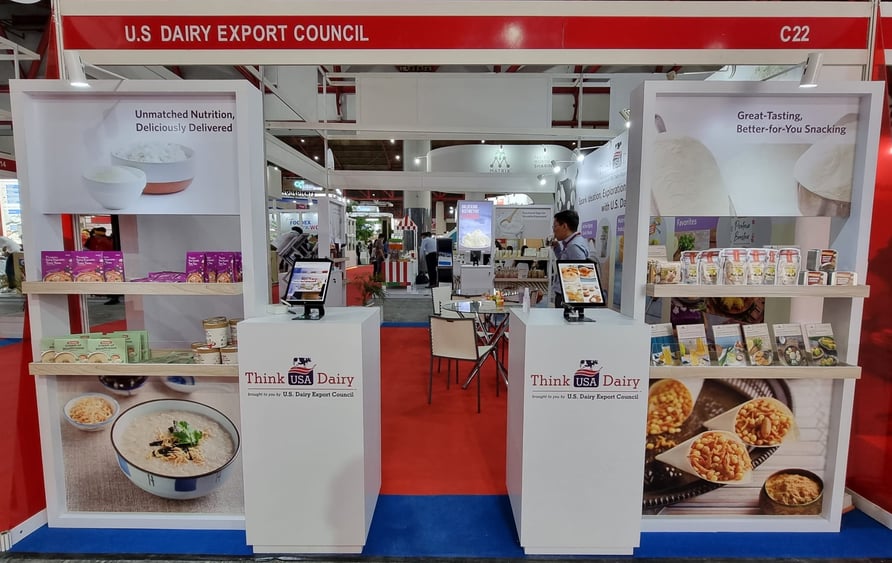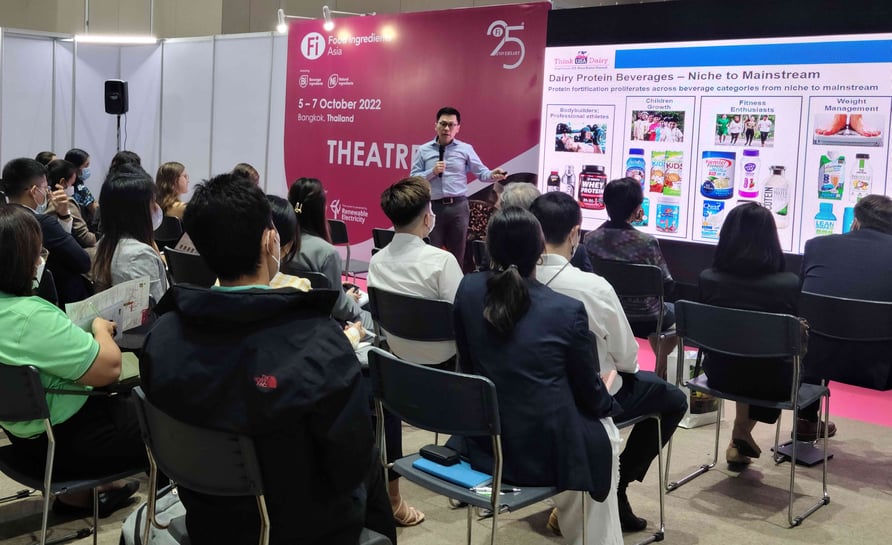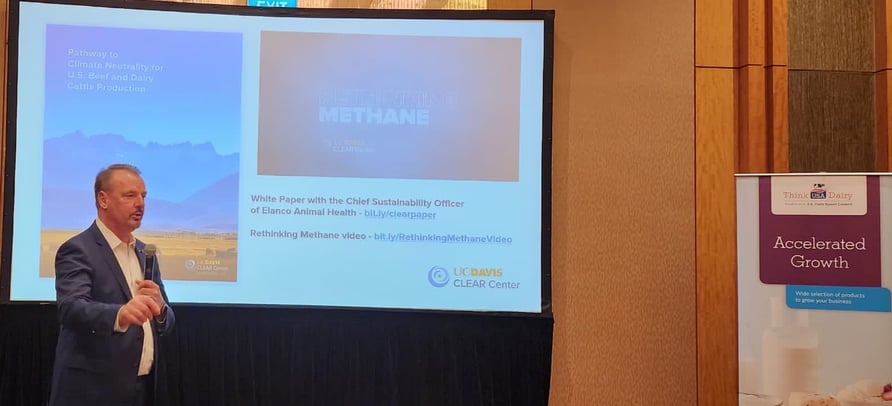HIGHLIGHTS: November 4, 2022
• Fi Asia in Indonesia, Thailand and Vietnam
• September U.S. dairy trade data
• Methane opportunities outlined at IUFoST
• USDEC secures UN accreditation
• International school nutrition research
• USDA opens registration for Ag Outlook Forum
• Market Summary: SMP plunges
• ALIC slates November butter tender
• USDA’s full list of Dairy and Products Annuals
• South Africa implements new shipping date requirement
• October updates to USDEC Export Guide
• House bill looks to increase FMD, MAP funding
• Company news: Bega, Yum, IHOP
Featured
Southeast Asia dairy ingredient trade shows come roaring back
After repeated postponements and cancellations over the past two-plus years, Southeast Asian food and beverage expositions returned in force over the last two months. Judging by participation and enthusiasm, buyers and sellers were happy to get back to meeting face-to-face.
USDEC drew crowds to booths at Food Ingredients (Fi) shows in Indonesia, Thailand and Vietnam Sept. 7-9, Oct. 5-7 and Oct. 12-14, respectively. USDEC Southeast Asia and Vietnam office staff and member companies shared a common message across the three expositions: U.S. dairy proteins, permeates and milk powders can deliver innovative new products that meet the specific health and nutritional needs of each region.

Attendees surround the USDEC booth at Fi Vietnam, Oct. 12-14 in Ho Chi Minh City, where they had a chance to sample 11 product prototypes made with U.S. dairy ingredients.
All three shows showcased new product concepts made with U.S. dairy ingredients, but each strove to go beyond the typical show floor experience.
- For the Fi Asia shows in Bangkok and Jakarta, USDEC not only sampled prototypes but also (for the first time) showcased packaging mock-ups to demonstrate how products might appear on the shelf at retail.
“We wanted to highlight the commercial potential of the product prototype work we’ve been doing, taking that work a step further from theoretical concepts to real, on-shelf products that can win consumers’ attention and wallets,” says Martin Teo, technical director-food applications, USDEC Southeast Asia.
Products included ready-to-drink beverages like honey ginger milky protein drink and sparkling honey lemon clear protein water, snacks like spicy curry potato chips (with lower sodium and without non-clean-label ingredients such as non-dairy creamer and maltodextrin), and ready-made meals like protein-boosted soups. The prototypes were developed in collaboration with Singapore’s Food Innovation & Resource Centre and by Martin Teo, USDEC technical director-food applications, at the U.S. Center for Dairy Excellence in Singapore.

The USDEC booth (before the show floor opened) showing the packaging mockups for prototype products featuring U.S. dairy ingredients.
- Prior to the Bangkok show, USDEC held an in-person U.S. Dairy Innovation and Supply Workshop that attracted 116 Thai food and beverage company representatives. The workshop highlighted the outlook for U.S. dairy ingredients and why the United States is best-positioned long-term to meet rising regional demand for dairy ingredients. A dozen USDEC member companies participated in the event, many presenting and providing table-top displays for one-to-one networking discussions with attendees.
- The Fi Vietnam show in Ho Chi Minh City went above and beyond the typical trade show prototype product selection, offering 11 different items for attendees to sample. The new product concepts, developed in collaboration with Bluetech Ingredients (Bluetechni) and Asia Chemical Corp. (ACC), sought to show how U.S. dairy ingredients can fuel on-trend innovations that deliver on Vietnamese consumer desires for healthful foods and beverages.
Booth visitors gave positive reviews to several products, saying particularly good things about two of Bluetechni’s healthy-snacking options: a brown rice protein bar made with U.S. WPC and a sponge cake made with U.S. dairy permeate and whey. ACC’s triple protein UHT milk and immune and digestive gummies made with U.S. permeate also garnered strong interest. The USDEC Vietnam office will be following up with one-on-one meetings with key visitors.

Martin Teo, USDEC technical director-food applications, Southeast Asia, gave a well-attended technical presentation at the Fi Asia show in Bangkok on food product development with dairy ingredients.
For more information on recent Southeast Asia food trade shows, see the Sept. 16 edition of Global Dairy eBrief, which contains coverage of USDEC’s participation at Food and Hotel Asia.
Whey, cheese and lactose lead U.S. dairy exports higher in September
U.S. dairy exports increased 7% in terms of milk solids equivalent (MSE) in September, keeping volume on a record pace for the year. Through the first three quarters, U.S. MSE exports were up 4% over 2021.
U.S. export value rose 20% to $789 million for the month, bringing year to date value to $7.26 billion—25% ahead of the first three quarters of 2021.
Whey (+18%, +8,897 MT), cheese (+5%, +1,719 MT) and lactose (+32%, +10,135 MT) all set new September highs, while butter shipments increased 49% (+1,598 MT). Year-over-year NFDM/SMP exports fell for the 10th consecutive month in September, dropping 7% (-4,953 MT) to 64,772 MT.
For a full recap and analysis of the numbers, read the U.S. dairy Exporter Blog Post, “U.S. dairy exports rise 7% in September.” Also visit the USDEC Data Hub and experiment with the interactive charts to find the information you need.
USDEC highlights U.S. dairy sustainability, dairy ingredient potential at IUFoST World Congress
This week at the International Union of Food Science and Technology’s (IUFoST’s) 21st World Congress in Singapore, USDEC continued to spread the word on how U.S. dairy strives to be global environmental, nutritional and innovation solutions. During USDEC’s technical session, “Pathways to Sustainable Nutrition: Consumer Voices and Dairy’s Journey,” market research insights on what consumers in Southeast Asia know, think and do when it comes to food sustainability were paired with science-backed details on the dairy sector’s path to greenhouse gas neutrality.
The session featured Anvaya Sharma, director, Ipsos Singapore, and Dr. Frank Mitloehner, professor at the University of California-Davis. Sharma outlined findings from a USDEC-funded custom study revealing that Southeast Asian consumers’ interest in sustainability is on the rise but that it is not yet at the forefront of food and beverage purchasing decisions compared to other factors such as price, taste and nutrition. (Anoo Pothen, director, consumer insights, USDEC Southeast Asia, explored the findings from the research in October at the special session prior to the USDEC Fall Membership Meeting and touched on some of them in her general session presentation, which members can watch again here.)
Mitloehner emphasized U.S. dairy’s progress and efforts to reduce its climate footprint and suggested that further work to shrink methane emissions could help dairy become a part of the environmental solution.
The methane opportunity
Mitloehner focused on the differences between methane and carbon dioxide in how they contribute to climate change. Specifically, due to those differences, he contends that by moderating methane use through feed additives or digesters, the U.S. dairy industry could actually pull carbon out of the atmosphere, inducing a cooling effect and helping efforts to limit global warming. (Click here to watch a 5-minute video from UC-Davis on rethinking methane.)

Dr. Frank Mitloehner, professor at the University of California-Davis, outlines the differences between methane and carbon dioxide in terms of atmospheric impact and how dairy can be part of the environmental solution through methane reduction.
USDEC Senior Vice President, Global Ingredients Marketing Vikki Nicholson-West and USDEC technical director-food applications, Southeast Asia Martin Teo also spoke at a separate luncheon session immediately following the technical session, introducing the U.S. Center for Dairy Excellence and providing an overview of the U.S. dairy ingredient portfolio and local-friendly innovation opportunities.
Background
This is the first time USDEC has sponsored the IUFoST World Congress and hosted a session at the event. The meeting aims to advance global food science and technology through education and training and foster the worldwide exchange of scientific knowledge and ideas, which in turn helps strengthen food science and technology’s role in ensuring global food security. Around 1,300 food scientists, engineers and technologists, food industry professionals, key opinion leaders and regulatory authorities attended the event.
USDEC earns accreditation to the UN Environment Assembly of the UN Environment Programme
On Oct. 26, the United Nations Environment Assembly (UNEA) of the United Nations Environment Programme (UNEP) officially notified USDEC that the organization has been granted “observer status.” This means that USDEC will now be able to formally participate in the UNEP process, advocate directly for U.S. dairy’s role in a sustainable food system, and promote U.S. dairy as an environmental solution.
Raising U.S. dairy’s voice at a needed time
Since its inception in 1972, UNEP has been the global authority that sets the environmental agenda and promotes the coherent implementation of UN environmental policies. Headquartered in Nairobi, Kenya, UNEP works through its divisions as well as regional liaisons, out-posted offices and a growing network of collaborating centers of excellence.
“Now is a critical time for USDEC engagement with UNEP, as UNEP has continued to expand its role in policy areas that could impact market access for U.S. dairy exports, including topics like antimicrobial resistance, animal health and animal welfare,” says Kelly Sheridan, USDEC vice president, Environmental Affairs.
UNEP is also leading global efforts to negotiate a treaty on reducing plastic waste that has the potential to impact processing and on-farm use of plastics, and is focusing on policies to promote agricultural biodiversity that could impact on-farm practices.
“USDEC’s accreditation will allow us to participate directly in the policymaking process on these issues and gives us a chance to insert our expertise into the formal process,” says Sheridan.
More work ahead
The Sustainability & Multilateral Affairs (SAMA) team will lead the relationship with UNEP. The team is planning a trip to Nairobi in February to focus on building relationships with the agency. For further information or to learn more about how you can support USDEC engagement with UNEP, please reach out to Kelly Sheridan at ksheridan@usdec.org.
USDEC joins governments, child and school nutrition experts to highlight the critical role of dairy in nourishing future generations
Last week, Janice Giddens, USDEC’s vice president of Sustainable Nutrition, joined the annual forum of the Global Child Nutrition Foundation (GCNF) in Cotonou, Benin. Attended by global and international leaders in child and school nutrition, this forum provides USDEC with opportunities to meet allies and build relationships with international policymakers who are developing solutions to sustainably nourish a rapidly growing global population.
USDEC is also a member of the GCNF Business Network, which engages the private sector to strengthen relationships with government-operated national school meal programs. Global and national nutrition guidelines that determine public procurement for school nutrition programs can impact taste preferences and consumption patterns of future generations and offer an opportunity when dairy foods are provided. Thus, school nutrition programs can present a direct and indirect opportunity for U.S. dairy exports in the short- and long-term.
School nutrition research critical
USDEC recently signed partnership agreements with GCNF and Global Dairy Platform supporting research on the inclusion of dairy foods in school nutrition programs in Latin America, the Caribbean and Kenya. USDEC will use the results of this research to determine future opportunities for U.S. dairy exports in school nutrition programs or to fill market shortfalls when local production is routed into schools. It will also be leveraged to open dialogues with global policymakers and governments in key markets about the role that U.S. dairy products play in sustainably nourishing children and future generations.
Pressure is rising for school nutrition programs to consider and incorporate sustainability into food procurement contracts and menu planning. There are strong signals that the 2024 Conference of the Parties of the UN Framework Convention on Climate Change (COP 28) will highlight the role of school nutrition programs in promoting better health for people and the planet. USDEC will continue to engage on this topic and advocate for U.S. dairy exports as a solution to promote healthier, resilient and more sustainable food systems and child health.
If you would like to learn more about this work, please reach out to Janice Giddens at jgiddens@usdec.org.
Events
USDA opens registration for 2023 Agricultural Outlook Forum
Registration is open for USDA’s 99th annual Agricultural Outlook Forum Feb. 23-24, 2023, at the Crystal City Gateway Marriott in Arlington, Virginia. The conference will feature a keynote address from USDA Secretary Tom Vilsack, a 2023 Agricultural Economic and Foreign Trade Outlook from USDA Chief Economist Seth Meyer, and 30 breakout sessions covering topics ranging from supply chain challenges to climate-smart agriculture to factors influencing the global marketplace.
More than 100 agricultural leaders and subject matter experts will share their insights at the forum, which is being held in person but also offers a virtual option. For more information, including registration options, an at-a-glance program and other details, click here.
Market Summary
SMP plunges at GDT
The Nov. 1 Global Dairy Trade (GDT) auction left little doubt that we are firmly in bear market territory. The GDT Price Index fell 3.9%, the third major decline in a row, with significant drops in SMP and WMP.
Despite heavy buying by North Asia (China), the average winning SMP price fell 8.5% to US$2,972/MT. Since the start of 2021, SMP has finished an auction below $3,000/MT only twice—this week and July 20, 2021. Prices are down 35% from the 2022 peak of US$4,599/MT set in April and down 15% in the last two auctions alone.
WMP dropped 3.4% to US$3,279/MT, its lowest level since December 2020. Prices are down 31% from 2022 peak of US$4,757/MT set in March and are down 12% over the last three auctions.
“Demand remains weak, depressed by concerns over inflation and consumer purchasing, and buyers appearing comfortable with current stocks levels. With no signs on the horizon that inflation will ease or global economic growth will rebound soon, the question is whether we will see further price erosion to pre-pandemic ranges in the coming weeks.
Cheese resilience
Cheese was one of the few products to see prices increase this week on the GDT, +0.9% to US$4,802. Unlike some of the other product categories, cheese has held in a pretty steady range of about US$4,800-$5,000 since June. North Asia (China) led buying this week, increasing volume compared to the previous auction and the same auction the previous year.
DairyAmerica expands GDT offerings
Dairy America is increasing the volume and range of products it offers on the GDT platform as of the Nov. 15 auction. The company is expanding from medium-heat SMP to offerings that also include low- and high-heat NFDM, low- and high-heat SMP and buttermilk powder.
“As the presence of the GDT events has expanded in all regions of the globe, we recognize the importance of having this as part of our DairyAmerica strategy to provide a consistent, reliable and sustainable U.S. dairy option to all participants of the GDT,” DairyAmerica said in a statement.
ALIC slates butter tender for November
Japan’s Agriculture and Livestock Industries Corp. (ALIC) announced plans for a new SBS butter tender for 1,000 MT for Nov. 28. Japan’s Ministry of Agriculture, Forestry and Fisheries (MAFF) will announce tender plans for the remainder of the fiscal year (through March 31, 2023) after it reviews the supply situation. For more information, contact USDEC’s Japan office at usdecjapan@marketmakers.co.jp or (011) 81-3-3221-6410.
USDA releases 12 Dairy and Products Annuals
USDA has now published a dozen 2022 Dairy and Products Annuals over the past couple of weeks. To download each, click on the respective country: Algeria, Argentina, Canada, Chile, the EU, Japan, Mexico, New Zealand, the Philippines, South Korea, Taiwan and Ukraine.
Market Access and Regulatory Affairs
South Africa begins enforcing new shipping date requirement on dairy product imports
The South African government is demanding that all health certificates must be issued for shipments within 10 days prior to export. The U.S. government is attempting to clarify South Africa's requirements and its official policy related to the certificate dates. USDEC will deliver an update when South African authorities provide more information.
“Until then, because shipments with health certificates not issued within 10 days prior to shipment risk being rejected, exporters should request certificates as soon as relevant information, such as the container and seal number, is available. Any questions can be directed to Bryan Jacoby at bjacoby@usdec.org.
USDEC updates 61 Export Guide documents in October
USDEC’s Market Access and Regulatory Affairs (MARA) team updated or revised 61 documents in the USDEC Export Guide last month. Changes include:
Volume 1: Tariffs and Classification
- Cambodia: New country added.
Volume 2: Import Requirements
- Australia: Updated manufacturer’s declaration heat treatment requirements, as well as requirements for composite and non-composite cheese.
- Cambodia: New country added.
- India: The Indian government will not allow the import of whey proteins for nutraceutical use without a health certificate.
- South Africa: The South African government is demanding that health certificates must be dated within 10 days prior to export.
Volume 3: Compositional Standards and Labeling Requirements
- Brazil: Updated contaminant and microbial sections in several standards, including cheese, milk powder, infant formula and whey.
- China: Updated pathogen requirements in several standards, including milk, milk powder, whey powder, infant formula, milkfat and cheese.
- GCC: Updated processed cheese standard.
Every month, USDEC’s Market Access team emails a list of guide updates to interested members. If there is anyone at your company who should be included on the distribution list for that email in the future, please contact Jessica Smith at jsmith@usdec.org.
Trade Policy
House bill calls for expanded export program funding
A bipartisan group of House members introduced a bill to double funding for the Foreign Agricultural Service’s Market Access Program (MAP) and Foreign Market Development (FMD) program. The programs have played a critical role in USDEC cheese and ingredient programming for years, helping raise global awareness and grow demand for U.S. dairy around the world.
“Without such public-private partnerships supporting our market development efforts, U.S. dairy exports would not be where they are today,” USDEC President and CEO Krysta Harden noted earlier this year, commenting on a study by the U.S. Agricultural Export Development Council (USAEDC). That study found that public-private partnership programs like FMD and MAP helped lift U.S. agricultural exports by an average of $9.6 billion annually from 1977-2019 (see Global Dairy eBrief, 5/20/22).
The House legislation is a companion to a Senate bill introduced in September under the name, Cultivating Revitalization by Expanding American Agricultural Trade and Exports (CREAATE) Act of 2022. USDEC and NMPF are members of the Coalition to Promote U.S. Agricultural Exports, which helped introduce the legislation. USDEC expects the bill will be considered as part of the 2023 farm bill deliberations.
Company News
Mergers, acquisitions and joint ventures
Perrigo acquired Nestlé’s Gateway infant formula manufacturing plant in Eau Claire, Wisconsin, along with the U.S. and Canadian rights to the Good Start infant formula brand. Perrigo said it would immediately invest $60 million to expand the plant’s capacity from about 13,000 MT per year to more than 16,000 MT per year. … Hong Kong-based infant nutrition company Ausnutria Dairy acquired a 50% stake in Dutch goat cheesemaker Amalthea. Amalthea and Ausnutria were already cooperating to make and market CleardMilk infant formula made from goat milk. (FoodBev.com, 10/26/22)
Company news briefs
Abbott Nutrition is building a new $500-million U.S. manufacturing facility for “specialty and metabolic infant formulas.” The company is in the final stages of site selection. (CNN, 10/19/22)
In Case You Missed It...
U.S. Dairy Exporter Blog
Market analysis, research and news subscribe hereUSDEC Twitter feed
Follow us here.